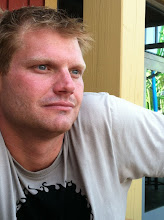Sunday, January 17, 2010
When I was in High School
Tuesday, January 12, 2010
Teaching like a deer trapped in headlights
I start out by giving notes, and follow it up with practice. I show my students what a polynomial is and what it isn't. I show them standard form, leading coefficient, degree, and graphical implications. We look at factored form and we add subtract, multiply, divide and blah blah blah polynomials. I'm doing the only thing I can think of to get them ready for the questions they'll see on the standardized test. But it's all very traditional. And when they show up to Thursday morning's class with memories of Tuesday's class, almost as blurry as mine of my 1st or 21st birthdays, I know I didn't reach them. And I don't know what to do, so I do it all over again the following week.
Friday, January 1, 2010
Y2KX
Wednesday, February 18, 2009
Cool schools
The more you get people around the world talking to each other, great, and the more they talk about what they’re learning, just wonderful...But I’m not at all sure, when you start attaching that to credits and degrees and courses, that it translates so well.
How will they test students? How much will the professors do? How well does the American or British curriculum serve the needs of people in Mali? How do they handle students whose English is not at college level?
-- Philip G. Altbach, director of the Center for International Higher Education at Boston College
It just doesn't seem like this guy wants anything to change, which isn't surprising, since he was a beneficiary of the system. What do you think? Can't students decide what they want to learn, won't that spark curiousity and creativity, and wouldn't a social network provide a far broader range of expertise than any university ever could? Which pushes us to think harder, a test or an online discussion with curious peers? We could work out accountability somehow.
I'm worried our higher education system exists primarily to serve professors. I think that a 21st century, online university, built around social networking could allow professors to spend more time doing what they want to be doing...research..and less time doing what, judging by their boring lesson structure coupled with unenthusiastic delivery, they apparently only do out of obligation...teach.
Tuesday, February 10, 2009
Boring Curriculums...
b. I started thinking about how this observation will affect my classroom. The first obvious answer is that I would replicate this specific activity in my classroom. From there I thought longer and harder about the general things I observed that I'd like to introduce too, because those are important too. I also reflected on those things too. By those things, I mean the things I stated in 6a. I also spent a lot of time struggling to answer this question and feeling like it was either badly worded, or too indirect for me. I thought more about how I don't like these meta-cognitive questions, and about if they are really bad or just really challenging in a good kind of way, but how silly it is that such an introspective question could ever be measured by an extrinsic rubric. But my mind was getting off-topic when I wrote that, and it only made me more and more angry with my credential program, which is constantly sucking my time away from things I'd rather be doing, and that I need to be doing, to do things like cite sources in APA format, or expand on a thinking process that I handled as effortlessly as I thought I could get away with (and regretfully undershot). Then I got back to thinking about the question at hand and thought about how much I have to learn from this teacher, and how far-reaching the effects of this observation may ultimately be. For starters, I thought of adding reflective writing and group roles to my class because I'm at the point in my professional development where I need to double the amount of actually implementing the things I've only previously talked about.I added what's in bold, and would like to spend more time re-thinking and re-wording but I can't do it last night. It's been a long day with what promises to be a long night, but for a brief moment I was finally excited to articulate something to whomever I'm supposed to be writing this stuff to. It's the first time I've actually cared about what I'm saying or trying to say. There has to be some kind of analog to my classroom, it must have something to do with quantity vs. quality.


